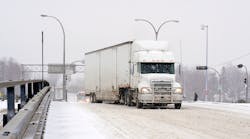Recent events like the massive weather-induced traffic jam on Interstate 95 remind us of the power of Mother Nature. While this was an extreme case of what can happen in the winter, there are countless stories of drivers getting stranded in winter weather—sometimes because of the weather but sometimes because of equipment failure.
Today’s commercial vehicles are very robust, reliable, and durable, but it is impossible to eliminate 100% of all vehicle breakdowns. Problems occur despite our best intentions. However, there are things fleets can do to minimize the risk of a breakdown. Proper maintenance is critical to the safe and efficient operation of trucks and trailers. And it is never more critical than during the winter. Roadside breakdowns are a pain whenever they occur, but there is added stress if the breakdown occurs in the winter.
During winter, make sure to pay extra attention to to some key tasks:
- Examine the vehicle’s air system to ensure there is no moisture in it that can freeze into ice and cause the system to shut down.
- Check tire pressure and tread depth because weather can affect inflation.
- Look at the charge in batteries, which tend to be less efficient in colder temperatures.
- Remind drivers of the importance of keeping sensors and cameras that are part of the advanced driver assistance systems clear of snow and ice so the systems can operate as designed.
Also remind truckers to drive even more carefully during the winter than they do during other times of the year. Roads can be slick without appearing to be, and one fast acceleration on a slippery road can spell disaster.
It’s also a good idea to suggest your drivers put together a “survival” kit to carry in the cab during the winter. Blankets, water, snacks, and flashlights can all come in handy when the truck and driver are sitting on the side of the road or stuck in a weather-related traffic jam.
As you are reading this, I imagine you are wondering what this has to do with freight efficiency? While it's true that a truck not moving isn't using any fuel so one could argue that was very efficient. But trucks are designed to deliver goods, so every time they are sidelined, they are actually very inefficient.
Adding to the inefficiency, when a truck is stuck on the side of the road in the winter, the driver is very likely going to idle the engine to keep warm. As we know, idling is extremely inefficient, but no one can blame the driver for idling the vehicle’s main engine in cold temperatures to keep warm while waiting for a tow or emergency repair.
Since drivers are a key element to a fleet’s success, let’s make sure that—especially in the winter—the trucks are up to date on their maintenance and make sure to give extra attention to components that may be affected by cold weather. While we should hope for the best—no roadside breakdowns during the winter, no weather-related traffic difficulties—we need to prepare for the worst and make sure drivers have a supply of the things that they will need to weather whatever winter throws at them.
Michael Roeth has worked in the commercial vehicle industry for nearly 30 years, most recently as executive director of the North American Council for Freight Efficiency. He serves on the second National Academy of Sciences Committee on Technologies and Approaches for Reducing the Fuel Consumption of Medium and Heavy-Duty Vehicles and has held various positions in engineering, quality, sales, and plant management with Navistar and Behr/Cummins.




